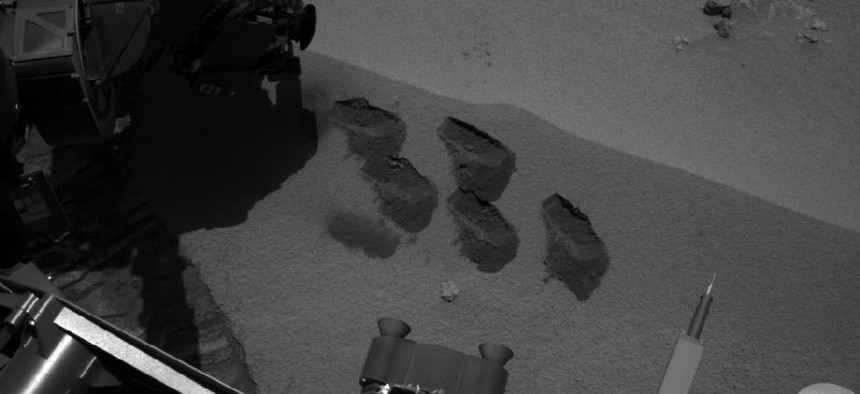
NASA's Mars rover Curiosity used a mechanism on its robotic arm to dig up five scoopfuls of soil, analyzing it with the Sample Analysis at Mars (SAM) suite of instruments inside the rover. (NASA/JPL-Caltech)
Mars Curiosity's ‘History Making’ Discovery Revealed, With a Caveat
NASA announced the discovery of organic compounds on the surface of Mars, though won't yet say if they originated from the planet's surface.

Subscribe
:
Newsletter
Facebook
LinkedIn
NASA’s Mars Curiosity rover has discovered organic compounds on the surface of Mars. Results from the rover’s first complete soil analysis since arriving on the Red Planet showed “water and sulfur and chlorine-containing substances,” the space agency announced in a statement on Monday.
NASA was unwilling to say definitively whether the organics are the byproduct of chemical processes on Mars itself. There remains a possibility that the compounds, which might indicate Mars once supported life, travelled to Mars with Curiosity or fell to the planet from space. For now, NASA is being careful not to overstate its find.
"We have no definitive detection of Martian organics at this point,” said SAM Principal Investigator Paul Mahaffy “but we will keep looking in the diverse environments of Gale Crater.”
Monday’s announcement came on the first day of the Fall Meeting of the American Geophysical Union in San Francisco. Last week, John Grotzinger, the principal investigator for the mission, set off wild anticipation about what the rover team would announce during the conference when he told NPR’s Joe Palca that his team had found something “for the history books.”
According to NBC News , Grotzinger now says that his earlier comments were misunderstood:
"What I've learned from this is that you have to be careful about what you say and even more careful about how you say it. We're doing science at the speed of science [but] we live in a world that's sort of at the pace of Instagrams. The enthusiasm that we had, that I had, that our whole team has about what's going on here ... I think it was just misunderstood."
Curiosity, a 1-ton robotic science laboratory, arrived on Mars Aug 5. It is the first rover capable of scooping and analyzing Martian soil samples. Its two-year mission is to determine whether conditions in Mar’s Gale Crater ever supported microbial life.







